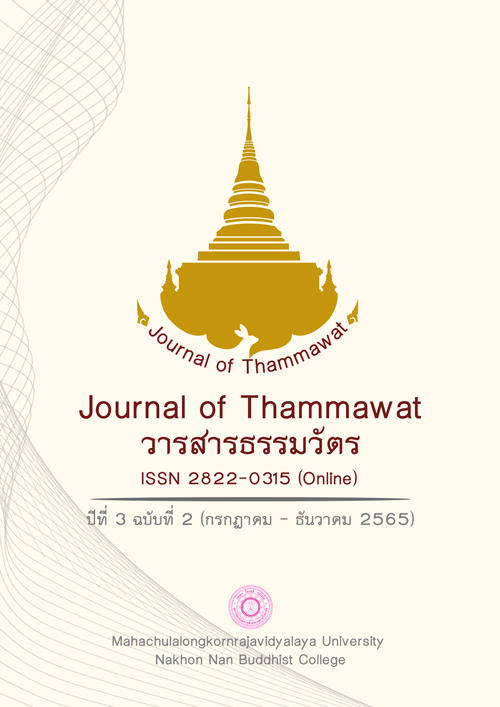The Relation Between the Conception in Principle of Law and Principle of Buddhism: The Concept of Students of Mahachulalongkornrajavidyalaya University, Chiangmai Campus
Main Article Content
Abstract
The qualitative research has 3 objectives: 1. to study relationship between the concept of law principles and the principles of Buddhism 2. To analyze the efficiency of justice based on the principles of Buddhism and Law 3. To analyze problems and obstacles regarding the justice caused by Buddhism and law principles application in accordance with the concept of the students of Mahachulalongkornrajavidyalaya University. Documentary study and field research by collecting datum by means of the in-depth interview by way of descriptive analysis.
Research results, 1.) the principles of law and Dhamma in Buddhism are related to each other because of the legislation mainly must do based on the Dhamma principles, but they are different on the matters of punishment because by the law, the one who is punished will obtain the abstract result and can be seen in this life but in Dhamma, the one who is punished will obtained the abstract result which will be effected to that one in next life. 2.) The law is always justice because the law mainly has been developed from Dhamma principles but some legislators are semi-immoral enforcers of the law in unjust and immoral 3.) Problems and obstacles concerning the justice of the law in same cases are the ones who enforce the Laws in the wrong ways for private and group interests more than the interests of the public.
Article Details

This work is licensed under a Creative Commons Attribution-NonCommercial-NoDerivatives 4.0 International License.
References
จรัญ ภักดีธนากุล. (2549). กฎหมายลักษณะพยาน. กรุงเทพฯ: จุฬาลงกรณ์มหาวิทยาลัย.
บุญชณัฎฐา กรัชกายพันธ์. (2559). การใช้หลักธรรมทางพระพุทธศาสนาสนับสนุนหลักการประโยชน์สาธารณะในกฎหมายมหาชนของไทย. (วิทยานิพนธ์นิติศาสตรมหาบัณฑิต). สถาบันบัณฑิตพัฒนบริหารศาสตร์.
พรรษพร ยกเชื้อ. (2541). พุทธศาสนากับปัญหาอาชญากรรมในสังคมไทย: ศึกษาความคำนึงถึงศีล 5 ของผู้กระทำความผิดในเรือนจำกลางคลองเปรม. (วิทยานิพนธ์ศิลปศาสตรบัณฑิต). มหาวิทยาลัยมหิดล.
พระพรหมคุณาภรณ์ (ป. อ. ปยุตฺโต). (2555). นิติศาสตร์แนวพุทธ. (พิมพ์ครั้งที่ 13). กรุงเทพฯ:
วิญญูชน.
วันชัย แสงสุวรรณ. (2550). การนำหลักธรรมในทางพระพุทธศาสนามาใช้สนับสนุนหลักกฎหมายทั่วไป ตามประมวลกฎหมายแพ่งและพาณิชย์. (วิทยานิพนธ์รัฐศาสตรมหาบัณฑิต). มหาวิทยาลัยธุรกิจบัณฑิต.
สมพร เทพสิทธิ์. (2548). เศรษฐกิจพอเพียงตามแนวทางพระราชดำริ. กรุงเทพฯ: สายรุ้ง.


